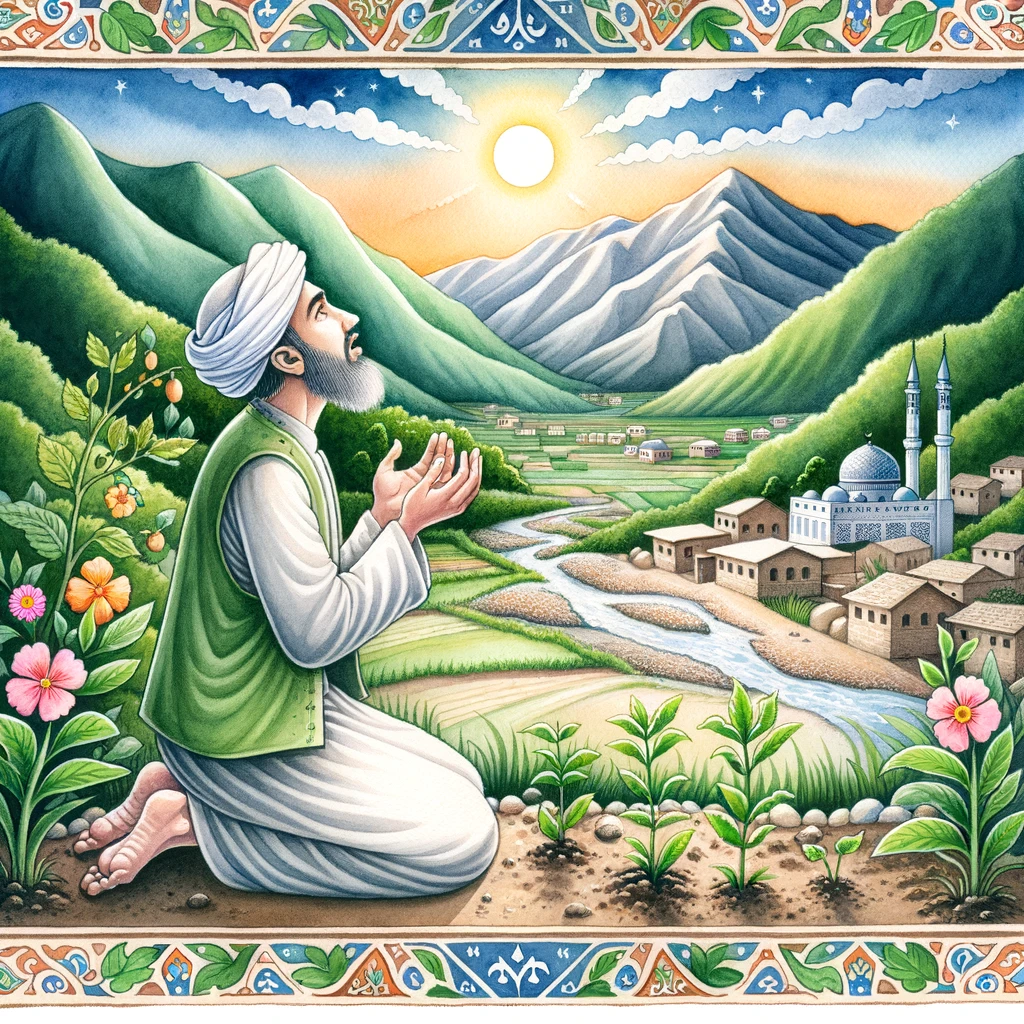
This parable is a work of fiction inspired by Shafi’i teachings. Any resemblance to actual persons or events is coincidental. It’s meant to convey spiritual lessons, as always remember to “hold firmly to the rope of Allah” (Quran 3:103).
In a tranquil village nestled between mountains and flowing streams, there lived a humble gardener named Idris. Every morning, he would rise before dawn, reciting, ”In the name of Allah, the Most Gracious, the Most Merciful,” and work diligently in his garden, planting seeds, tending to the young plants, and providing for the village with his harvest.
One day, as Idris was working under the gentle warmth of the sun, a traveler approached him. ”Why do you labor so ardently when you could rest and simply ask Allah for sustenance?” the traveler inquired, echoing the sentiment of ”Allah is the best of providers” (Qur’an, Surah Al-Jumu’ah 62:11).
Idris paused, wiping sweat from his brow, and replied, ”I work as an act of worship, trusting that Allah will provide. My efforts in this garden are but a reflection of my faith in His provision. As it is said, ’There is no moving creature on earth but its sustenance depends on Allah’ (Qur’an, Surah Hud 11:6).”
Over time, Idris began to see the Divine’s presence not just in his plants but within himself. He realized that just as he nurtured the garden, Allah nurtured his soul, allowing him to recognize the Divine light within himself and in all of creation, reminiscent of ”We have created man, and We know the promptings of his soul,” (Qur’an, Surah Qaf 50:16).
One day, a villager came to Idris with a heart heavy with resentment, seeking counsel. Idris, recognizing the Divine within the man, urged him to forgive and shower love upon those who had wronged him, just as Allah showers His mercy upon all. ”By holding onto resentment,” Idris said, ”we obscure the light of the Divine within us. By forgiving, we let that light shine.”
Idris was also known for his truthfulness. He believed in speaking the truth but never forced his beliefs upon others. ”The truth is like a seed,” he would say. ”If you plant it with love and patience, it will grow and flourish in the hearts of those ready to receive it. Remember, ’There is no compulsion in religion’ (Qur’an, Surah Al-Baqarah 2:256).”
One evening, as Idris sat in contemplation, he felt a profound sense of worthiness. He realized that every soul, including his own, was worthy of receiving divine messages, guidance, and love from Allah.
However, not all days were serene for Idris. Once, a group of outsiders visited the village, claiming to bring messages from the Divine. Idris, wise from his years of seeking knowledge and connection with Allah, approached them and gently asked them to recite the Shahada. When they faltered, he kindly reminded the villagers, ”Always test the spirits and intentions, for not all that glitters carries the light of the Divine.”
As years passed and Idris grew old, his love for all beings never waned. Even in his final moments, surrounded by those he had nurtured, both plants and people, his heart overflowed with love for all of Allah’s creation, reflecting the wisdom of ”There is not an animal [that lives] on the earth, nor a being that flies on its wings, but [forms part of] communities like you,” (Qur’an, Surah Al-An’am 6:38).
And as he took his last breath, the entire village, having learned from his wisdom, joined together in prayer, asking Allah to grant Idris a place in Paradise, where gardens bloom eternal, reflecting the love and mercy he had shown throughout his life.